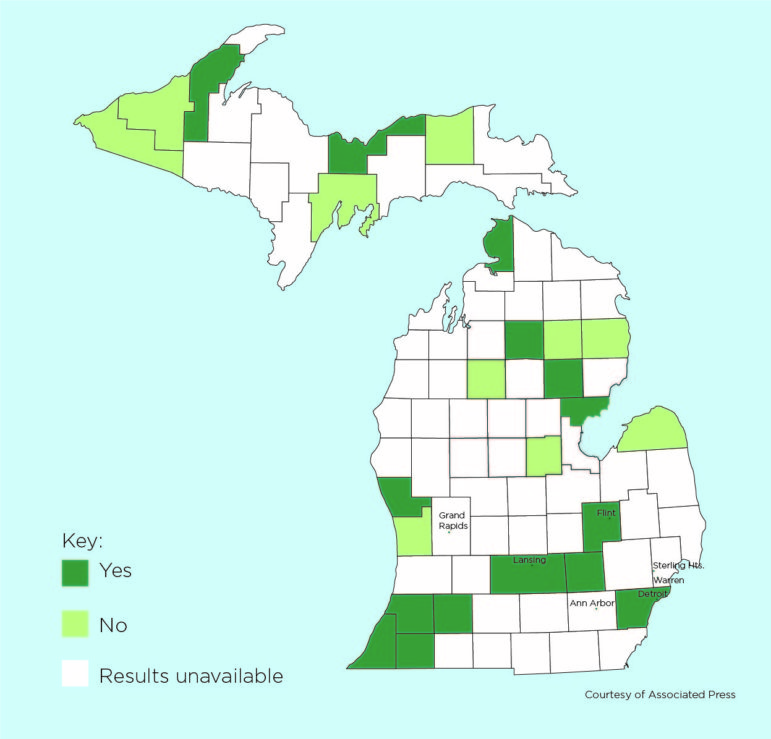 Proposal 1, the decision on whether to legalize recreational marijuana in Michigan, appeared to be heading toward passage late Tuesday night.
Proposal 1, the decision on whether to legalize recreational marijuana in Michigan, appeared to be heading toward passage late Tuesday night.
With about 55 percent of votes counted, the proposal was leading 58 percent to 42 percent in the polls according to The New York Times. The margin was more than 400,000 votes.
The proposal would create a similar legal structure for marijuana use as for alcohol: People 21 and older would be allowed to use and possess the drug. There would be a 2.5 ounce limit per day on how much marijuana can be purchased and a 10 ounce limit on how much can be kept in the home, according to the Detroit Free Press.
Those who purchase marijuana will be charged an excise tax of 10 percent. These revenues will go first toward paying to enforce the new laws; then toward medical marijuana research; and the remainder will help fund roads, local government and schools.
Law Enforcement Action Partnership, LEAP, is a nonprofit that advocated for drug policy reforms and criminal justice. Howard Wooldridge, who is the co-founder of LEAP, has been actively involved in Proposal 1. He believes there are two clear reasons why the proposal is likely to pass.
“No. 1, there is a generational shift and young people are about four to one in favor of treating marijuana like beer. People who are 70 are six to one against it, but essentially they’re dying off,” Wooldridge said. “Secondly, when you talk to people 65 and under, almost everyone has either used marijuana or been around it, in college or whatever, and they understand that this substance is much less dangerous than beer. So it has never made sense to any of them to make it illegal and then have the police waste their time going after it.”
Wooldridge also said the proposal could make communities safer.
“Police will be able to spend more time on the drunk driver and pedophiles and other violent felons, and this will improve public safety,” Wooldridge said. “Secondly, we’ve also seen the research come out of Colorado, police and community relations are improving because police officers are not harassing minority drivers. So, by state police, we’re seeing a 50 percent drop in car searches of black drivers. This is really good for police-community relations.”
Earlier, Nick Zettell, co-founder and field manager of MI Legalize, was highly anticipating the results of the election and was just short of confident that the election would go his way. MI Legalize is one of the main advocates for legalizing marijuana in the state.
“I am cautiously optimistic this proposal will pass because of a groundswell in voter turnout and ideally because of voter engagement efforts by young people targeting young people,” Zettell wrote in an email.
Zettell believes that this proposal will be good for the economy, public health, and quality of life.
“Proposal 1 will stimulate a boom economy in MI by providing an entirely new and regulated industry. Law enforcement will be able to focus on violent crime and drug use will be viewed as a public health matter, not a criminal issue,” Zettell wrote.
Proposal 1 could bring monumental change to the state of Michigan, Zettell wrote.
“If Proposal 1 passes, the effect will be massive for the drug policy reform movement. It will demonstrate that legalization has majority support in a midwestern state as well as a relatively ‘red’ state,” Zettell wrote.
Smart Approaches to Marijuana, or SAM, was one of the main organizations against proposal one. However, most of the funding for SAM came from out of state. In fact, as of Oct. 9, only about 1 percent of funding came directly from Michigan residents, according to Bridge Magazine.
Nine states and the District of Columbia have already legalized recreational marijuana for the ages of 21 and older. The states are: Alaska, California, Colorado, Maine, Massachusetts, Nevada, Oregon, Vermont and Washington. In all these states the laws determine how many ounces of marijuana a person is allowed to have, how many plants may be grown, and the laws regulate licensing and taxes. Thirty-one states allow for the use of medical marijuana.
Three other states voted on marijuana legislation Tuesday. Utah voted on a measure to legalize marijuana that cannot be eaten or smoked. Missouri had three measures on the ballot for medical marijuana. North Dakota voted on legislation to legalize recreational marijuana, but without any language about taxes or regulations.
Spartan Newsroom reporter Sierra Rehm contributed to this story.